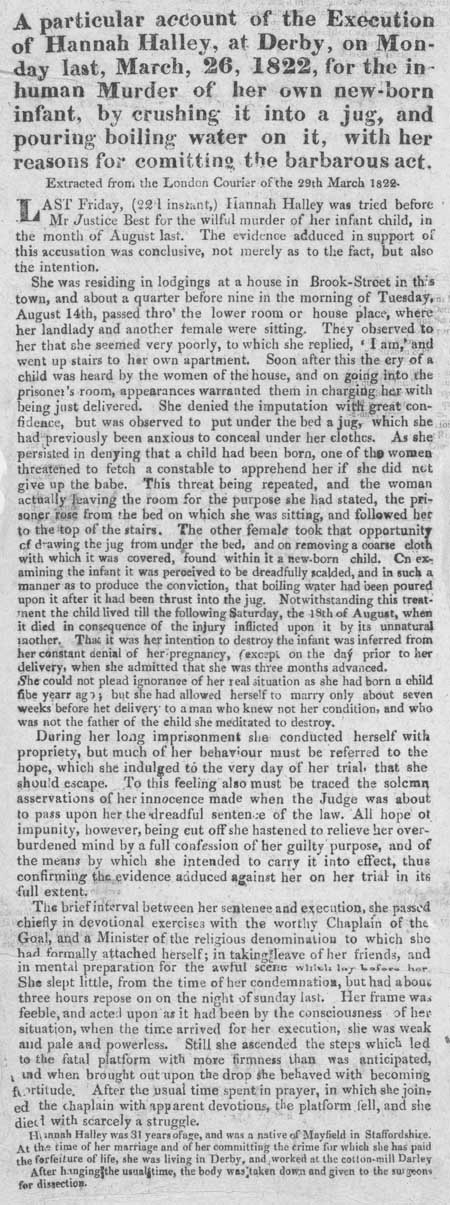Transcription
A particular account of the Execution
of Hannah Halley, at Derby, on Mon-
day last, March, 26, 1822, for the in-
human Murder of her own new born
infant, by crushing it into a jug, and
pouring boiling water on it, with her
reasons for comitting the barbarous act. Extracted from the London Courier of the 29th March 1822. LAST Friday, (22d instant,) Hannah Halley was tried before
Mr Justice Best for the wilful murder of her infant child, in
the month of August last. The evidence adduced in support of
this accusation was conclusive, not merely as to the fact, but also
the intention. She was residing in lodgings at a house in Brook-Strcet in this
town, and about a quarter before nine in the morning of Tuesday,
August 14th, passed thro' the lower room or house place, where
her landlady and another female were sitting. They observed to
her that she seemed very poorly, to which she replied, ' I am,' and
went up stairs to her own apartment. Soon after this the cry of a
child was heard by the women of the house, and on going into the
prisoners room, appearances warranted them in charging her with
being just delivered. She denied the imputation with great con-
fidence, but was observed to put under the bed a jug, which she
had previously been anxious to conceal under her clothes. As she
persisted in denying that a child had been born, one of the women
threatened to fetch a constable to apprehend her if she did not
give up the babe. This threat being repeated, and the woman
actually leaving the room for the purpose she had stated, the pri-
soner rose from the bed on which she was sitting, and followed her
to the top of the stairs. The other female took that opportunity
of drawing the jug from under the bed, and on removing a coarse cloth
with which it was covered, found within it a new-born child. On ex-
amining the infant it was perocived to be dreadfully scalded, and in such a
manner as to produce the conviction, that boiling water had been poured
upon it after it had been thrust into the jug. Not with standing this treat-
ment the child lived till the following Saturday, the 18th of August, when
it died in consequence of the injury inflicted upon it by its unnatural
mother. That it was her intention to destroy the infant was inferred from
her constant denial of her pregnancy, ( except on the day prior to her
delivery, when she admitted that she was three months advanced. She could not plead ignorance of her real situation as she had born a child
fibe yearr ag) ; but she had allowed herself to marry only about seven
weeks before het delivery to a man who knew not her condition and who
was not the father of the child she meditated to destroy. During her long imprisonment she conducted herself with
propriety, but much of her behaviour must be referred to the
hope, which she indulged to the very day of her trial that she
should escape. To this feeling also must be traced the solemn
asservations of her innocence made when the Judge was about
to pass upon her the dreadful sentence of the law. All hope of
impunity , however, being cut off she hastened to relieve her over-
burdened mind by a full confession of her guilty purpose, and of
the means by which she intended to carry it into effect, thus
confirming the evidence adduced against her on her trial in its
full extent. The brief interval between her sentence and execution, she passed
chiefly in devotional exercises with the worthy Chaplain of the
Goal, and a Minister of the religious denomination to which she
had formally attached herself ; in taking leave of her friends, and
in mental preparation for the awful scene which lay boforo her
She slept little, from the time of her condemnation, but had about
three hours repose on on the night of Sunday last. Her frame was
feeble, and acted upon as it had been by the consciousness of her
situation, when the time arrived for her execution, she was weak
and pale and powerless. Still she ascended the steps which led
to the fatal platform with more firmness than was anticipated,
and when brought out upon the drop she behaved with becoming
fortitude. After the usual time spent in prayer, in which she join-
ed the chaplain with apparent devotions, the platform fell, and she
died with scarcely a struggle. Hannah Halley was 31 years of age, and was a native of May field in Staffordshire,
At the time of her marriage and of her committing the Crime for which she has paid
the forfeiture of life, she was living in Derby, and worked at the cotton-mill Darley After hanging the usual time, the body was taken down and given to the surgeons
for dissection.
View Commentary | Download PDF Facsimile
|
 |
Date of publication:
1822 shelfmark: L.C.Fol.74(070)
 View larger image
View larger image
|


